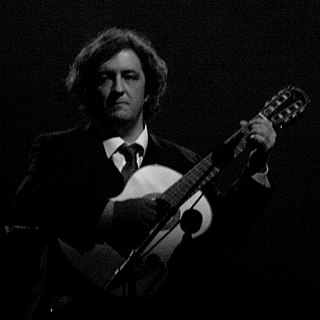
Pedro Machado Abrunhosa is a Portuguese singer, songwriter, musician and composer. Trained in jazz music, Abrunhosa started his career in the 1980s playing in jazz bands and teaching in music and art schools in Porto. He is a co-founder of the Jazz School of Porto.

Agenor de Miranda Araújo Neto, better known as Cazuza, was a Brazilian singer and songwriter, born in Rio de Janeiro. Along with Raul Seixas, Renato Russo and Os Mutantes, Cazuza, both while fronting Barão Vermelho and at solo career, is considered one of the best exponents of Brazilian rock music. In his 9-year career, he sold more than 5 million albums and achieved 11 number one singles and 18 Top 10 singles in Brazil.

Jorge Manuel de Abreu Palma is a Portuguese singer and songwriter. A well-known and acclaimed songwriter in Portugal, Palma started his solo career in 1972 and was a busker in several cities abroad before settling back in Portugal in 1982. He achieved success in the late 1980s with songs such as "Deixa-me Rir" and "Frágil", and renewed success in 2007, with the single "Encosta-te a Mim".

Rui Manuel Gaudêncio Veloso is a Portuguese singer-songwriter and musician. Commonly called "The father of Portuguese rock", Veloso was a major figure in the boom of Portuguese rock music in the 1980s. His 1980 debut album Ar de Rock, which includes the hit single "Chico Fininho", is considered a landmark of Portuguese rock. During the 1980s and 1990s, Veloso released numerous other successful singles and albums in Portugal.
GNR is a Portuguese pop rock band formed in Porto in 1980 and currently consists of vocalist Rui Reininho, bassist Jorge Romão and the only remaining founding member drummer Tóli César Machado. The formation of the group, that shares its acronym with the Guarda Nacional Republicana, coincided with the so-called Boom of Portuguese Rock that took place during the eighties, of which GNR are one of the few survivors to this day.

António Augusto da Silva Veloso is a Portuguese former footballer who played most of his professional career with Benfica. A gritty defender who could appear in the flanks and on occasion in the middle, he spent a decade and a half at his main club, and was team captain from 1988 to 1995.
Alberto Ferreira Paulo, known professionally as Paulo Gonzo, is a Portuguese singer and songwriter.

Ana Cláudia Moura Pereira, known as Ana Moura, is a Portuguese fado singer. An internationally recognized singer, she was the youngest fadista to be nominated for a Dutch Edison Award.

Zé Ramalho is a Brazilian composer and performer. Zé Ramalho has collaborated with various major Brazilian musicians, including Vanusa, Geraldo Azevedo and Alceu Valença.

Silence Becomes It is the debut album by Portuguese band Silence 4, released in June 1998. It was a huge success in Portugal, reaching a six-time platinum certification, but had less success internationally.

Pro-Música Brasil (PMB), previously Associação Brasileira dos Produtores de Discos (ABPD), is an official representative body of the record labels in the Brazilian phonographic market.

Leva-me aos Fados(in English: Take Me To The Fados) is the fourth album by Portuguese fado singer Ana Moura, the successor to the multi-award-winning "Para Além da Saudade" (2007). Leva-me aos Fados features participations of José Mário Branco, Lisbon Bagpipes, Manuela de Freitas, Amélia Muge and Toze Brito. Like its predecessors, has the production of Jorge Fernando.

Pedro Aires Ferreira de Almeida Gonçalves Magalhães, known as Pedro Ayres Magalhães, is a Portuguese musician, best known as a founding member and the main songwriter of the musical group Madredeus. Magalhães has also been a member of the pop rock band Heróis do Mar and the Portuguese supergroup Resistência.

Ar de Rock is the debut album by Portuguese musician Rui Veloso, released in July 1980 by EMI-Valentim de Carvalho.

Auto da Pimenta is the sixth studio album by Rui Veloso, released in 1991.

O Concerto Acústico is a live album and video album by Rui Veloso, released through EMI Portugal in 2003. The album was released on CD and DVD. It was recorded live at Duvideo Studios, except for "Presépio de Lata", "Cavaleiro Andante" and "Primeiro Beijo", which were recorded at the Belém Cultural Center in Lisbon in December 2002, and "Porto Sentido", which was recorded at the Porto Coliseum in February 2003.

Salvador Vilar Braamcamp Sobral is a Portuguese singer, who won the Eurovision Song Contest 2017 for Portugal with the song "Amar pelos dois", written and composed by his sister, Luísa Sobral. In doing so, he gave Portugal its first ever win in the contest since its debut in 1964, ending the longest winless run by a country in Eurovision history. Sobral and his entry hold the Eurovision record for the highest-scoring winner, having earned a total of 758 points under the current voting system, after winning both the jury vote and televote.

Linda Martini are a Portuguese rock band based in Lisbon, formed in 2003. Originally a five-piece, the band was founded by André Henriques, Pedro Geraldes (guitar), Sérgio Lemos (guitar), Claúdia Guerreiro (bass) and Hélio Morais (drums). The band recently added Rui Carvalho as a full time fourth member after a brief period acting as a trio.

Mariza is the sixth studio album by fado singer Mariza. It was released in 2015 by Warner Music Portugal. The album peaked at No. 1 on the Associação Fonográfica Portuguesa chart and was certified as a double platinum album. It also reached No. 13 on US World chart. The album received a Latin Grammy nomination for Best Portuguese Language Contemporary Pop Album in 2016.

















